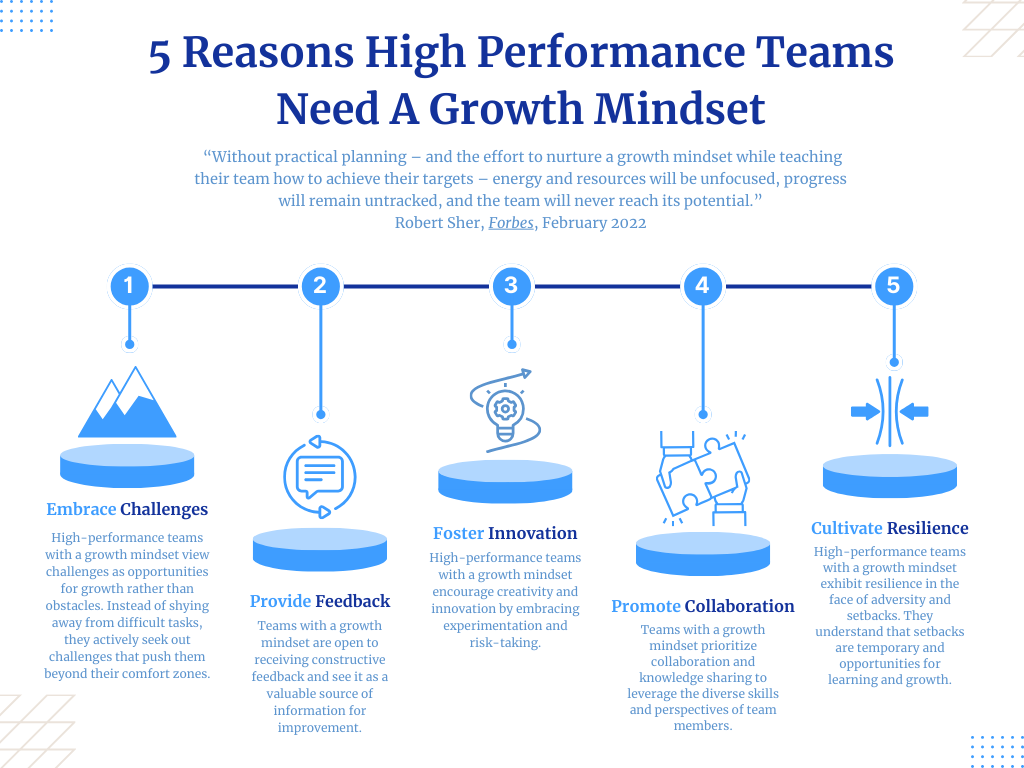
5 Reasons High Performance Teams Need A Growth Mindset
High-performance teams and a growth mindset are closely intertwined concepts in organizational psychology and management theory.
A growth mindset, as popularized by psychologist Carol Dweck, refers to the belief that abilities and intelligence can be developed through dedication and hard work. In the context of teams, a growth mindset can foster resilience, innovation, and adaptability, all of which are crucial for achieving high performance.
As Robert Sher noted in Forbes, “Without practical planning – and the effort to nurture a growth mindset while teaching their team how to achieve their targets – energy and resources will be unfocused, progress will remain untracked, and the team will never reach its potential.” Here are five of the many ways high-performance teams require a growth mindset:
- Embracing Challenges: High-performance teams with a growth mindset view challenges as opportunities for growth rather than obstacles. Instead of shying away from difficult tasks, they actively seek out challenges that push them beyond their comfort zones. This mindset encourages team members to tackle complex problems with enthusiasm and resilience, knowing that overcoming obstacles leads to personal and collective development.
- Learning from Feedback: Teams with a growth mindset are open to receiving constructive feedback and see it as a valuable source of information for improvement. Rather than feeling threatened or defensive, team members actively seek feedback from peers, leaders, and stakeholders to identify areas for growth and development. They view feedback as an essential tool for refining their skills, enhancing performance, and achieving better results as a team.
- Fostering Innovation: High-performance teams with a growth mindset encourage creativity and innovation by embracing experimentation and risk-taking. They understand that failure is a natural part of the learning process and see setbacks as opportunities to learn and innovate. This mindset cultivates a culture where team members feel empowered to explore new ideas, test hypotheses, and adapt their approaches based on feedback and results.
- Promoting Collaboration: Teams with a growth mindset prioritize collaboration and knowledge sharing to leverage the diverse skills and perspectives of team members. They recognize that everyone brings unique strengths and experiences to the table and value contributions from all team members. By fostering a culture of inclusivity and collaboration, high-performance teams can tap into the collective intelligence of the group to solve problems, generate new ideas, and drive innovation.
- Cultivating Resilience: High-performance teams with a growth mindset exhibit resilience in the face of adversity and setbacks. They understand that setbacks are temporary and opportunities for learning and growth. Instead of dwelling on past failures or setbacks, team members focus on solutions, adapt their strategies, and persevere through challenges with determination and optimism. This resilience enables the team to overcome obstacles, stay focused on their goals, and ultimately achieve high levels of performance.
In summary, high-performance teams with a growth mindset embrace challenges, seek feedback for learning, foster innovation through collaboration, and cultivate resilience in the face of adversity. These characteristics enable them to continuously improve, adapt to change, and achieve exceptional results as a team.

